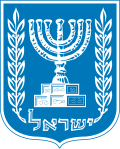| Part of a series on the |
 |
|---|
The April 2019 Israeli legislative election was held using closed list proportional representation. Each party presented a list of candidates to the Central Elections Committee prior to the election.
Contents
- Blue and White
- Gesher
- Hadash–Ta'al
- Kulanu
- Labor Party
- Likud
- Meretz
- The New Right
- Shas
- United Arab List–Balad
- Union of the Right-Wing Parties
- United Torah Judaism
- Yisrael Beiteinu
- Zehut
- Minor parties
- Ahrayut LaMeyasdim
- Ani VeAta
- Arab List
- Betah – Social Security
- Brit Olam
- Daam Workers Party
- Education
- HaTikva LeShinui
- Ihud Bnei HaBrit
- Justice for All
- Kavod HaAdam
- Ketz
- LeMa'an Ezrahim Sug Bet
- Kol Yisrael Ahim and Peula LeYisrael
- Magen
- Manhigut Hevratit
- Mehathala
- Na Nach
- New Zionist Party
- Ofek Hadash BeKavod
- Older Citizen's Party
- Pashut Ahava
- Pirate Party
- Pitaron LeAza
- Reform Party
- Shavim
- Social Justice
- Tzomet
- Yashar Party
- Zekhuyotenu BeKoleinu
- References